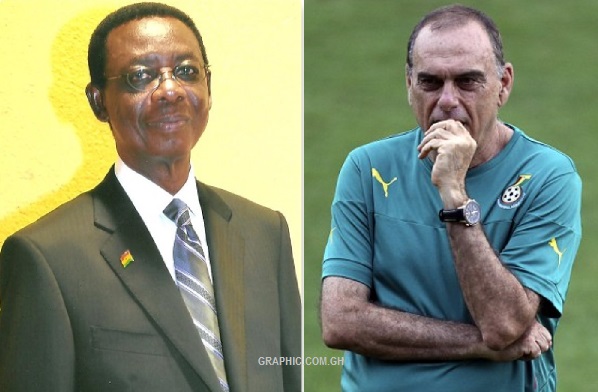
Ambassador Quarcoo queries Avram Grant’s tenure as Stars coach
Goodwill Sports Ambassador and patron of the Sports Writers Association of Ghana (SWAG) Ray Quarcoo questioned the tactics of former Black Stars coach Avram Grant throughout his two-year tenure.
To him, the Israeli’s tactics have taken the shine that characterises Ghana’s play and, therefore, suggests ways of restoring Ghana’s dwindling fortunes.
Below are excerpts of the interview;
Q: Your Excellency, having been around for a long time what do you make of coaches of the Black Stars?
A: Since association football was introduced in Ghana, then Gold Coast, the national team, Black Stars, had been managed by different coaches at different times(out of a total of 41,nine were local coaches). George Ainsley, a British, was the first full-time trainer hired to steer the technical bench of the team (1958-59). Sjolberg and Josef Ember (1959-63).
Sjolberg, the Swede, and the Hungarian, Ember, prepared the team for a home-grown coach C.K. Gyamfi, whom Sjolberg coached in his playing days, to take over. Charles Kumi Gyamfi, popular called CK took over in 1963 and by the records, perhaps he was the most successful of them all. He guided Ghana to win its first African title in 1963 and two others subsequently in 1965; which period is considered the golden era of Ghana football, and 1982, making him one of the most successful coaches in the history of the continental tournament besides former Egypt manager Hassan Shehata.
On the trail of C.K. Gyamfi was another local coach, Osam Duodo, who won the ultimate in 1978, bringing Ghana’s total to four. Thereafter, we chased in futility the golden fleece; featuring mostly different foreign coaches. This is not to say it is bad to have a foreign coach because some have excelled in other African countries as well. For instance, it was a foreign coach, Ratomir Dujkovic, who was first to help Ghana qualify to the World Cup.
Q: Sir, do you share the view that expatriate coaches are better than their local counterparts?
A: I have heard several arguments why foreign coaches are more preferable than their local counterparts but the most annoying one is that “most soccer administrators on the continent believe that expatriate coaches are better than the local ones; and that the reality on the ground is that, most people following the game of football in Africa have noticed that foreign coaches seem to be more disciplined and serious in their activities than those on the continent when it comes to the national team job.
Q: What do you think accounts for this?
A: The argument goes on that “foreign coaches seem to be a bit ahead of their local counterparts as the game of football has a large coverage abroad than in Africa; they are easily abreast of new rules and regulations of the game of football, including some logistics during camping such as diet, physiotherapy, condition for release, transfer of players etc.”
Q: As an experienced sports envoy, what would you suggest to the Black Stars handlers?
A: “The first thing for Africans to do, if we want a local coach to be in charge, is to make sure that he is well trained, of course somewhere abroad for some years; he is disciplined enough while the country puts up decent infrastructures to facilitate his job; as he will be given a considerable salary to unable him to do his work properly without interference, whether he is a former footballer or not.”
How annoying these arguments sound! They are plausible because I am not against the choice of a foreign coach. Any coach is welcome if he is qualified with the requisite technical ability and ready for the job presently. But the problem here is how long we have to rely on foreign coaches to build our own team for us. What will be the future of our current galaxy of stars now playing in the big leagues in Europe after their retirement?
Q: What must Ghana do in our search for Avram Grant’s replacement?
A: For the way forward, we need to reflect on the past and revisit the period of the golden age of Ghana football. Ghana’s first ever footballer to play professionally in Europe was C.K. Gyamfi and after his stint with Fortuna Dusseldorf, under State arrangement, through the wisdom and instrumentality of the greatest sports administrator Ghana ever had, Ohene Djan, he trained as a coach at Cologne, one of the world’s most reputable centre for the training of coaches at the time, inspired by the great German coach Hennes Weisweller.
To the best of my knowledge, the nine local coaches who had so far handled the Black Stars attended coaching courses with FIFA accreditation and have distinguished themselves on various platforms both at home and continentally. Avoiding sounding superstitious, since all the four titles were won by local coaches, I strongly believe that we need to look critically at upgrading our local coaches at the State’s expense, as a medium to long-term plan.
This must not be misconstrued as an attempt of imposition of my views on those charged with this responsibility but rather to serve as food for thought even as they set about finding a new coach.
